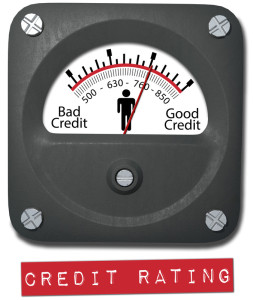Can filing Bankruptcy actually help repair your credit and increase your credit score?
It’s true. Most of my client’s credit scores actually go up after their bankruptcy filing. The main reason is that upon the bankruptcy court ordering a Discharge of your debt, your debt to income ratio is dramatically improved. That, coupled with the fact that most people learn a valuable lesson from the bankruptcy experience, and studies show that they are likely only to file once in their lives and take better charge or their finances after the bankruptcy, helps their credit score. Your creditors, their bill collectors, collection attorneys and agents want you to believe that bankruptcy will ruin your credit for the rest of your life. They don’t want you to file bankruptcy because they will not be paid and will not be allowed to hound you for payment. I have filed thousands of consumer bankruptcy cases in the metro Detroit area for over 28 years and the vast majority of my clients find it easier to obtain credit after their bankruptcy case is filed than if they had struggled alone trying to pay overwhelming debt with little or no disposable income.
My office will pull your credit report and analyze your current credit score and what it is likely to be after your bankruptcy case.
As part of my bankruptcy services, I pull my client’s credit reports just prior to the filing of their bankruptcy case. By the time most people come into my office, their credit scores are quite low due to numerous late payments, charge-offs, collection agency activity and lawsuits or creditor judgments. A Chapter 7 or Chapter 13 bankruptcy filing is meant to deal with these problems and result in a court ordered discharge which similar to paying them off, releases your personal liability on the debt. This is why most of my client’s FICO scores actually go up within just a few months of the bankruptcy discharge order being entered in their case.
Order a Free copy of your Credit Report at least once per year.
The law allows you to obtain a free copy of your credit report once per year from each major credit reporting bureau. Go to annualcreditreport.com which will link you to the major companies. When your bankruptcy judge grants you a discharge, you should view this date as your fresh financial start. This discharge date allows you to start rebuilding your credit and increasing your credit score from a definite point in time, whereas without it, there are various moving dates of derogatory items on your credit report that will stay there for seven years from the date the debt was incurred. By far the best thing that you can do after your discharge is simply to pay all of your debt on time, don’t be late. This includes all new debts from medical bills to utility bills and credit cards. Yes, even if you never want to see another credit card in your life, many of my clients report to me that they receive pre-approved low balance credit cards shortly after their bankruptcy case is discharged, often from the very same credit card companies that were just included in my client’s prior bankruptcy. The choice is yours if you want to get a credit card, but if you do, use it sparingly and be sure to pay the balance in full every month and if possible even set it up on an auto-pay basis where it actually pays the amount in full or the minimum monthly payment (I advise paying in full whenever possible) by automatically going into your bank account.
How Long will a Bankruptcy Stay on My Credit Report?
The major credit reporting agencies generally report a bankruptcy for up to 10 years from the date a Chapter 7 bankruptcy case was filed and 7 years in the case of a Chapter 13 bankruptcy filing. As stated above, however, most of my clients credit scores actually improve after the case is filed rather than go down. Remember, to many creditors or potential lenders after bankruptcy, you have become a better credit risk to them than before the bankruptcy when you had such a high debt to income ratio. Because the bankruptcy just eliminated most if not all of your debt, the odds that you will be able to pay any new debt that you incur are quite good. Of course, there will be potential lenders or landlords who do not completely understand bankruptcy and the fact that in a typical year over 1 million people in the United States file bankruptcy to help them deal with overwhelming debt. Most lenders fortunately understand that bankruptcy is a federal law designed to help people get a fresh start financially and will be eager to help you provided that your income and employment history show that you have the ability to meet your new obligations. The Law Offices of Walter Metzen and Associates has had many clients over the years qualify for car loans shortly after bankruptcy and mortgage or home loans only 2 years after receiving their Bankruptcy discharge.
How to Dispute Credit Reporting Errors with the Credit Reporting Agencies.
There is a Federal Law that protects you from inaccuracies on your credit report. The Federal Fair Credit Reporting Act is designed to regulate the major credit reporting agencies to make sure that they are only reporting true and accurate information as they gather and sell information about how you pay your bills or whether you have been sued by a creditor or filed bankruptcy to their clients, primarily creditors and other businesses. As mentioned above, you should pull your own credit report at least once a year. Go over it carefully and check it for inaccurate information. If you find something that is inaccurate, the website where you are getting the report from will have an online dispute form which, in most cases, has check boxes such as, this account was included in bankruptcy or this account was paid or is not mine, etc. The online dispute form is easy to fill out and easy to submit. The credit reporting agency will investigate the dispute (within 30 days) and most likely delete the derogatory information. Remember, they can only report information that is true and accurate. The agency must review your evidence and is required to provide you with a written report of the outcome of the investigation and another copy of your credit report if your request for investigation results in a change. If the agency does not resolve the dispute to your satisfaction, you are allowed to add a brief statement to your bureau file.
Follow this link for an in-depth discussion on how to dispute credit report errors after you have filing a bankruptcy in Michigan.
Credit report inaccuracies must be corrected or deleted by the Credit Reporting Agency.

Be sure to check your credit score at least once a year after your bankruptcy for inaccuracies and if you find them, dispute them.
The credit reporting agency is required to remove or correct inaccurate information from your credit report, usually within 30 days after you dispute it. They are not required to remove true and accurate data from your file unless it is outdated (negative information that is more than 7 years old) or cannot be verified after their investigation. If your credit reporting agency dispute ultimately results in any type of change to your credit report, the credit reporting agency is not allowed to simply reinsert into your bureau report a disputed item unless the information source (usually the creditor) verifies its accuracy and completeness. The credit reporting agency also must provide you with a written notice advising you that it has reinserted the derogatory notation. This notice that will be provided to you must include the name, address and phone number of the information source so that you may independently contact them.





